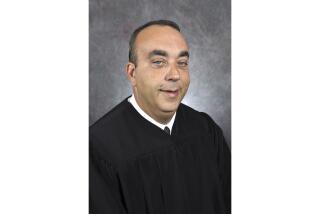Coptic woman trawls for votes in Egypt’s south
She drives a tiny car along sugar cane fields and across the deserts of southern Egypt, campaigning for votes in a harsh land of sectarian tensions and tribal loyalties.
Hoda Naeem Makkar is running in Sunday’s parliamentary election, which for the first time will allot women a percentage of legislative seats. That is one hurdle overcome. But Makkar is a Christian seeking Muslim ballots at a time of religious bloodshed and recrimination.
“Ten or 15 years ago, the idea of having a female member of any local council, let alone parliament, was totally unacceptable for most voters and politicians,” she said. “Now I have the luxury to only worry about being a candidate from a religious minority.”
Much of the attention surrounding the election has focused on opposition boycotts, arrests of Muslim Brotherhood candidates and criticism that the ruling National Democratic Party is likely to dominate yet another vote. But echoing like an unsettling coda beneath those headlines is the animosity between Muslims and Coptic Christians.
Makkar’s potential constituency lies about 300 miles south of Cairo, in the Qena region. Politics is a rough game in this land; religious and clan considerations permeate every aspect of life. Within the last 14 months, a Coptic man has gone on trial for kidnapping and raping a Muslim girl. Then Muslim gunmen retaliated by killing six Copts in a drive-by shooting outside a church in nearby Nag Hammadi.
Days ago, a Muslim mob set 10 Christian homes on fire after rumors spread that a Muslim woman and Coptic man in a remote village were secretly dating. Imams and priests have attempted to defuse passions, but the country, whose religious denominations have lived in relative peace for centuries, is hardening along sectarian lines.
Copts in Nag Hammadi told Makkar, who is running as an independent, that they fear reprisals from Muslims and will not venture to the polls Sunday. If so, she has little more than a quixotic chance of winning: The city of Qena has 35,000 Coptic voters and 65,000 Muslim voters. Nationwide, Copts make up 10% of a population of about 82 million.
History offers little repose on the arid swath of wheat fields and aluminum factories beneath a sky pricked by crosses and crescents. Founded by St. Mark in the 1st century, the Coptic Orthodox Church in Egypt predates Islam by hundreds of years. The religious divides in the south, said Makkar, were drawn ages ago when Muslim tribes migrated across the Red Sea and settled among Christians along the Nile.
“It is as simple as that; Copts give their votes to Coptic candidates and Muslims vote for and support Muslim nominees,” said Makkar, an agricultural engineer hoping for one of 64 slots designated for women in the 518-seat lower house of parliament. “Copts in general are in fear of taking part in elections. Previous experiences in which they were intimidated and bullied … forced many of them to stay at home on election days.”
A 53-year-old mother of two, Makkar looked beyond the political arithmetic as she drove to a monastery to meet scores of Christians gathered for prayer and speeches. She urged them to vote for her so that their “sons and grandsons” will have a Christian voice in a parliament dominated by President Hosni Mubarak’s ruling party.
“We [Copts] need to be active in order to claim our rights,” she told the crowd. “We can’t keep saying that we’re being oppressed and stay at home. We have to be politically determined to earn our rights and responsibilities.”
Coptic Pope Shenouda III told Muslims during the 2005 presidential election to support Mubarak as the best hope for stemming Islamic extremism and protecting Coptic rights. But many Christians have been disillusioned. They have since complained that they have received scant presidential attention and have become more marginalized.
Karima Kamal, a columnist for Al Masry Al Youm newspaper, wrote last week that “it’s time to recognize that allowing oneself to be manipulated is the wrong way to go. It turns Copts into a card to be played at times and frightened at others, and jerked around by false hopes and empty promises.”
Makkar broaches national themes, but she prefers to keep her rhetoric and promises local: economic development, sanitation improvement and easing the region’s persistent traffic woes.
Sayed Donkol, a building contractor in Qena, supports Makkar. He predicted that her reputation as a local councilwoman and her work for several nonprofit organizations would broaden her appeal.
“Makkar is definitely more popular than the [ruling party] candidate who will run against her,” Donkol said. “I’m sure that if everything goes fine without any interference from the ruling party, Makkar will win.”
But she is not likely to break through Muslim clan allegiances and win over men like Ahmed Mahmoud.
“I come from the tribe of Al Ashraf, and I will give my vote to our tribe’s candidate,” he said, paying no attention to Makkar. “Al Ashraf has had members of parliament for the past 70 years, and our nominees are the best to fill such positions.”
She’s heard it all before and was undeterred, climbing back into her car for another long day of campaigning.
Hassan, of The Times’ Cairo Bureau, reported from Qena and Times staff writer Fleishman from Cairo.
More to Read
Sign up for Essential California
The most important California stories and recommendations in your inbox every morning.
You may occasionally receive promotional content from the Los Angeles Times.











